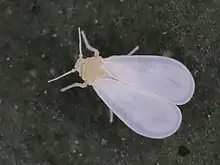Beet pseudoyellows virus
Beet pseudoyellows virus (BPYV) is a species of virus in the genus Crinivirus.[1]
| Beet pseudoyellows virus | |
|---|---|
| Virus classification | |
| (unranked): | Virus |
| Realm: | Riboviria |
| Kingdom: | Orthornavirae |
| Phylum: | Kitrinoviricota |
| Class: | Alsuviricetes |
| Order: | Martellivirales |
| Family: | Closteroviridae |
| Genus: | Crinivirus |
| Species: | Beet pseudoyellows virus |
| Synonyms | |
| |
The virus was first recognised by James E. Duffus of the United States Department of Agriculture, and reported in 1975 under the title 'A new type of whitefly-transmitted disease – a link to the aphid-transmitted viruses'.[2] Beet (Beta vulgaris) in a research greenhouse unexpectedly presented symptoms characteristic of the aphid-vectored virus Beet yellows virus, despite no aphids being present. Instead, greenhouse whiteflies (Trialeurodes vaporariorum) were present and determined to be the vector. The presumed new species of virus was designated 'Beet pseudo-yellows virus' (note the hyphen, omitted in the currently accepted name). Further investigation revealed the virus typically causes stunting, interveinal yellowing, and/or chlorotic spotting in its hosts, and that at least an additional 36 species of plants from various families are susceptible to infection.[2]
Images
_Leaves_of_Beta_vulgaris_(beetroot)_at_Bichlh%C3%A4usl_in_Frankenfels%252C_Austria.jpg.webp) Beta vulgaris (uninfected individual) – first known host and namesake
Beta vulgaris (uninfected individual) – first known host and namesake Trialeurodes vaporariorum – vector
Trialeurodes vaporariorum – vector
References
- "ICTV Taxonomy history: Beet pseudoyellows virus". International Committee on Taxonomy of Viruses. Retrieved 20 June 2020.
External links
| Wikispecies has information related to Beet pseudoyellows virus. |
- Image and general information at Seminis
- Images at Texas A&M AgriLife Extension
- Rfam entry for 3'-terminal pseudoknot of BPYV